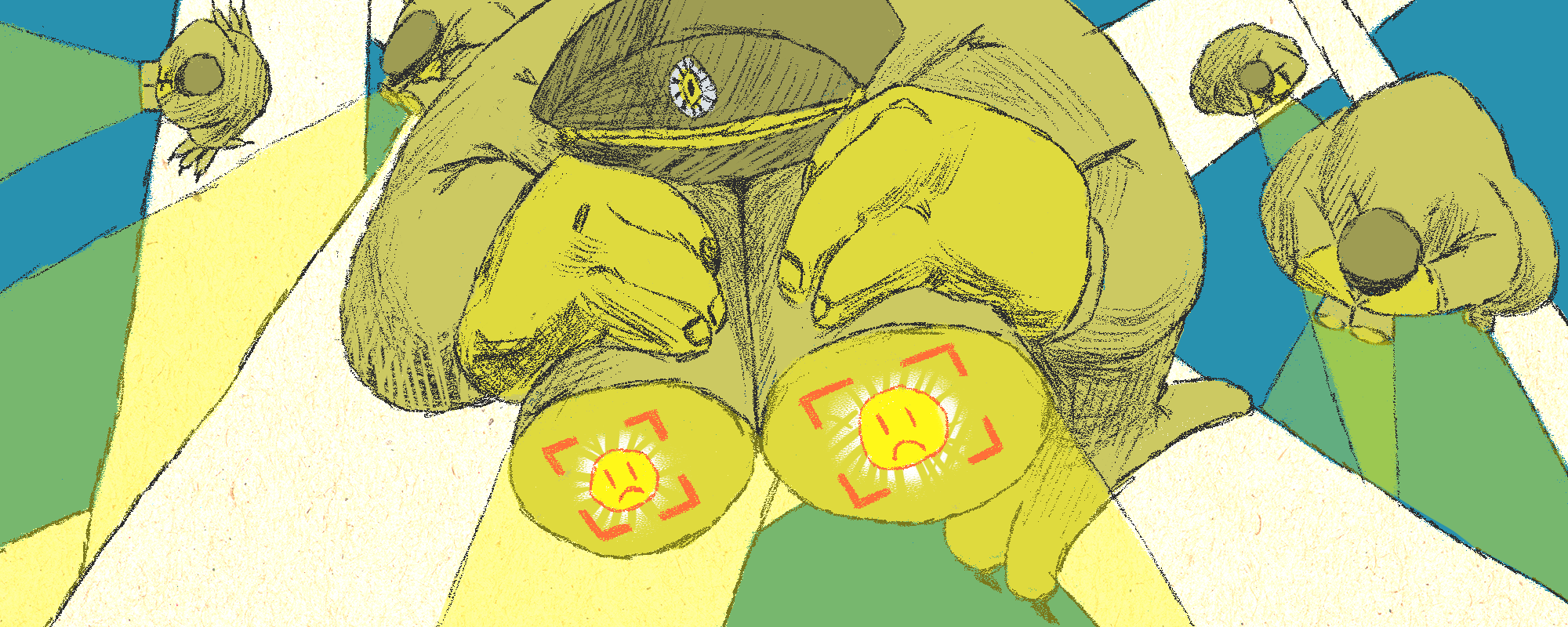Publication date: 02.08.2023
On 4 July 2023, the European Court of Human Rights issued an order directly condemning Russia’s police use of a facial recognition system against dissidents. At the same time, the authorities are increasing the use of technology for repressive purposes. Today we talk about the excuses given by the Kremlin regarding spying on activists and why the ECHR deems this practice unacceptable.
We know of at least 595 cases where the facial recognition system (FRS) was used against dissenters. In 141 of them, detention was «preventive». FRS was also utilized in the war draft effort. The Kremlin plans to add FRS functions to border cameras. In the spring of 2023 it became known that Kyrgyzstan had joined in the Russian FRS system. Now if Russia places somebody on the wanted list, they will be traced in Kyrgyzstan too — the Central Asian nation has become a common refuge for Russians fleeing the draft.
The city surveillance cameras, metro cameras, and even some portable video recorders can be integrated with the FRS.
On 4 June, ECHR issued a ruling on the case «Glukhin v. Russia». The court found that using the FRS to detain picketers is a violation of the constitutional right to privacy and freedom of speech. The Russian police detained activist Nikolai Glukhin, in a Moscow metro car in 2019. According to the authorities, Glukhin was on the wanted list, and the FRS was used to flag him to the police.
Once detained, Glukhin learned that the detention was sparked by his earlier metro trip with a man-sized cutout depicting political prisoner Konstantin Kotov and a banner about Kotov’s case. Police interpreted Glukhin’s actions as an unauthorised and premeditated solitary picket with and drew up an administrative offence protocol under Part 5 of Article 20.2 of the Administrative Offences Code.
From the case file, it became known that employees of the Centre for Countering Extremism (CCE) «during monitoring of „the Internet“ network» found a video on the Telegram app. In the video, Glukhin was holding the cutout of Kotov. The cops then proceeded to conduct «operational-search measures» (said measures were not specified) to establish the identity and location, shown on the video. Afterward, the CCE used footage from surveillance cameras in order to track Glukhin’s movements.
In Russian courts, Glukhin argued that the use of operative-search measures in his case violated Russian law. According to Federal Law No. 144-FL of 18.08.1995 «On Operative Investigative Activity», such actions can only be carried out to detect, suppress and solve criminal offences, not administrative ones. The CCE officers thus allowed an unjustified invasion of privacy.
The Russian courts disagreed with Glukhin’s reasoning, so he appealed to the ECHR. Russian Prosecutor General’s office submitted its objections to the European Court, where it confirmed that there was in fact no warrant out on Glukhin. However, it still insisted on the legality of the operational search activities.
The ECHR sided with Glukhin and noted that Russia lacked a legal framework restricting the use of facial recognition technology. The court ruled that the government violated Glukhin’s right freedom of expression by applying excessive means — surveillance using a facial recognition system — to the peaceful activist.
Even though neither the case file nor the objections of the Prosecutor General’s Office explicitly stated that the FRS had been used against Glukhin, the ECHR considered this to be a proven fact.
The Court, relying particularly on our report, found that Glukhin’s explanation as well as the form of the «operational-search measures» were sufficient evidence of the use of the FRS. This decision would certainly impact handling of similar cases in the ECHR.
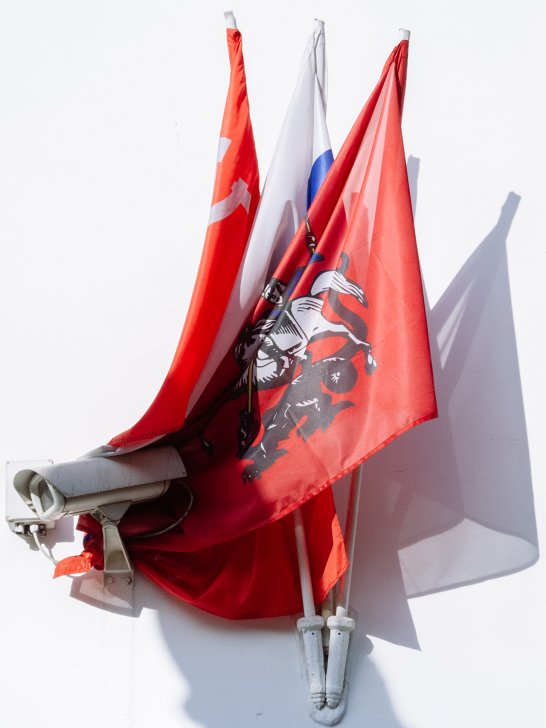
OVD-info works with complaints against the use of the FRS not only in the European Court, but also in the Russian ones. By the end of 2022, with the help of OVD-Info, detainees filed 18 administrative lawsuits in which they demanded to recognise the use of the FRS "Sphera" in the Russian metro and subsequent detentions as unlawful. All of the lawsuits concern “preventive” detentions, the number of which increased dramatically in 2022. This means that people who, according to the authorities, could potentially protest were detained on public holidays and other "dangerous" days to prevent possible protest actions, whether or not any were actually planned.
In some cases, police admitted that detainees were put on the wanted list in connection with previous prosecution under Article 20.2 of the Code of Administrative Offences of the Russian Federation. This article is utilized to punish participants and organisers of protests. Another article used is the one on discrediting the Armed Forces of the Russian Federation, 20.3.3 of the Code of Administrative Offences.
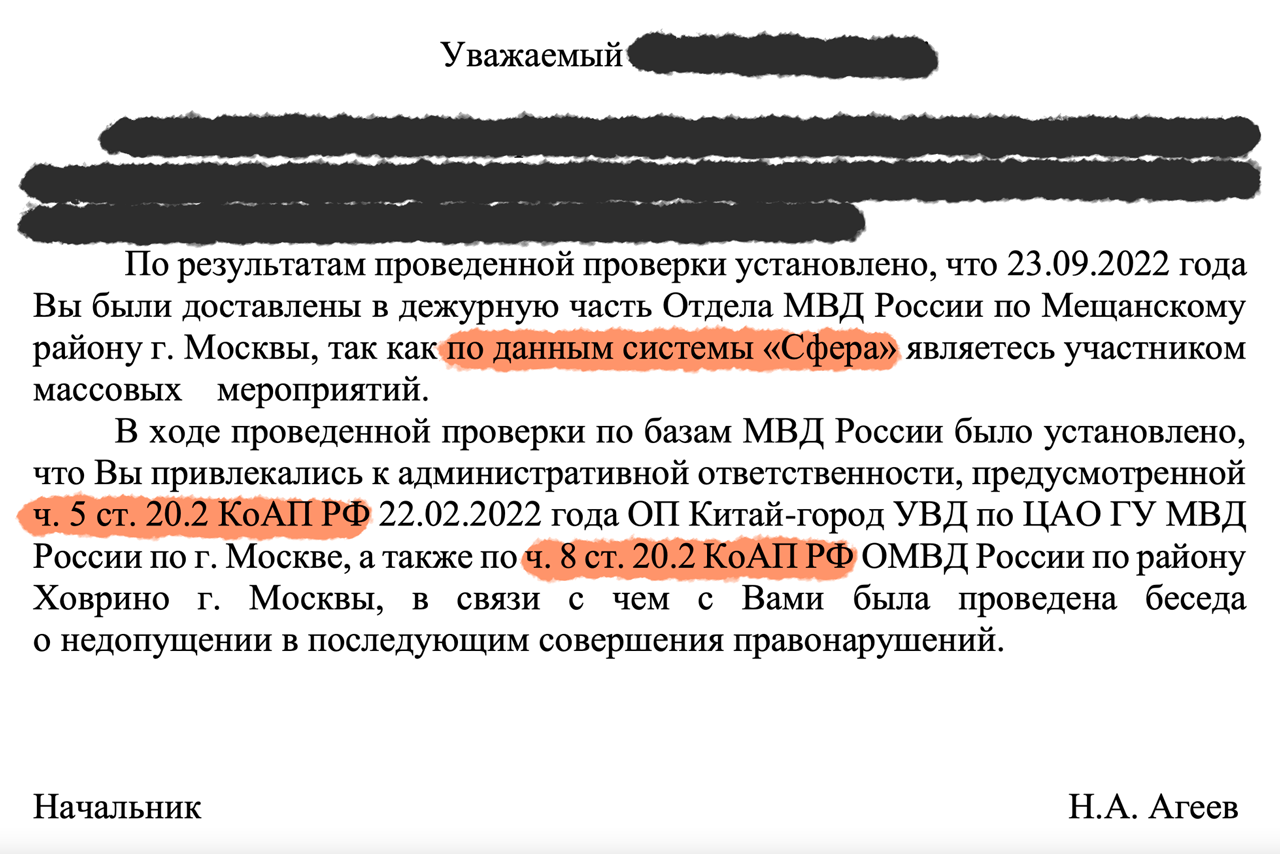
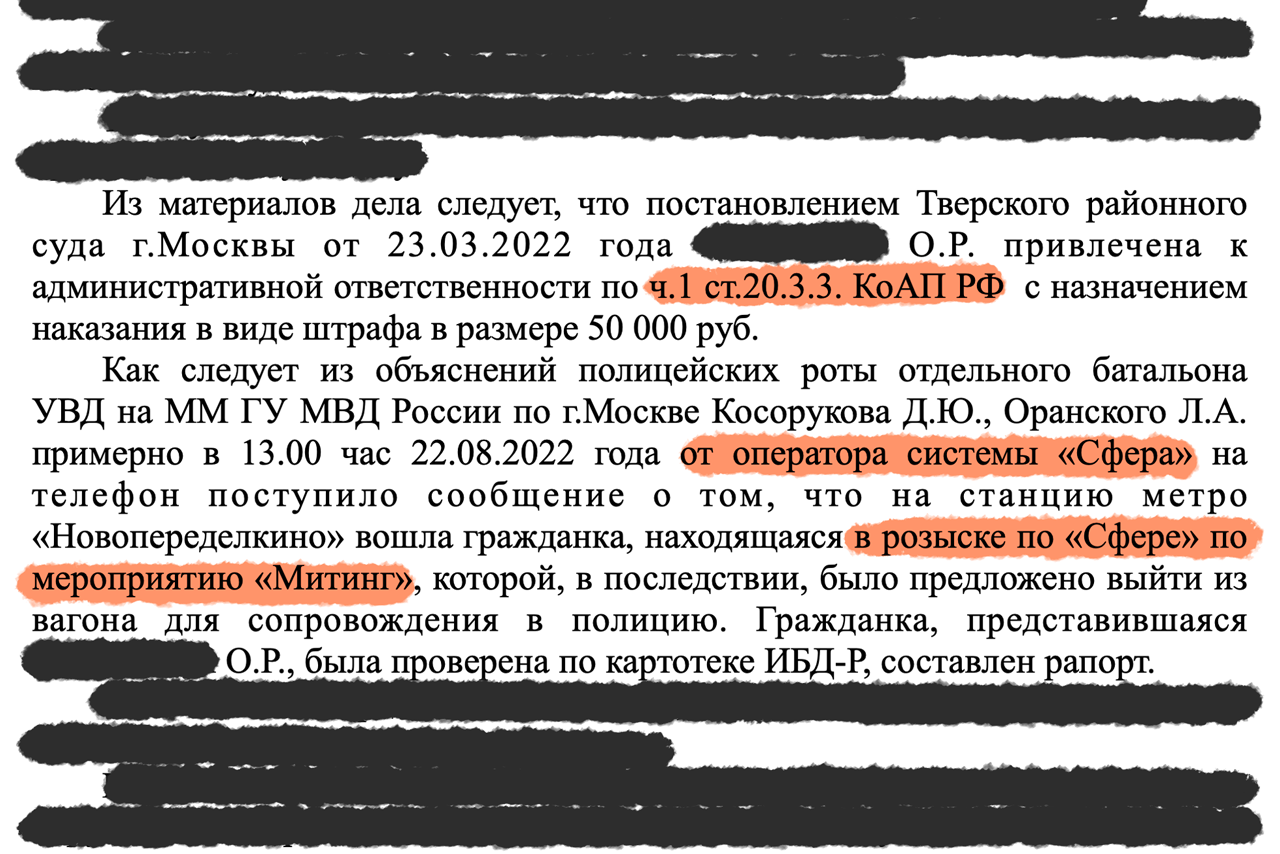
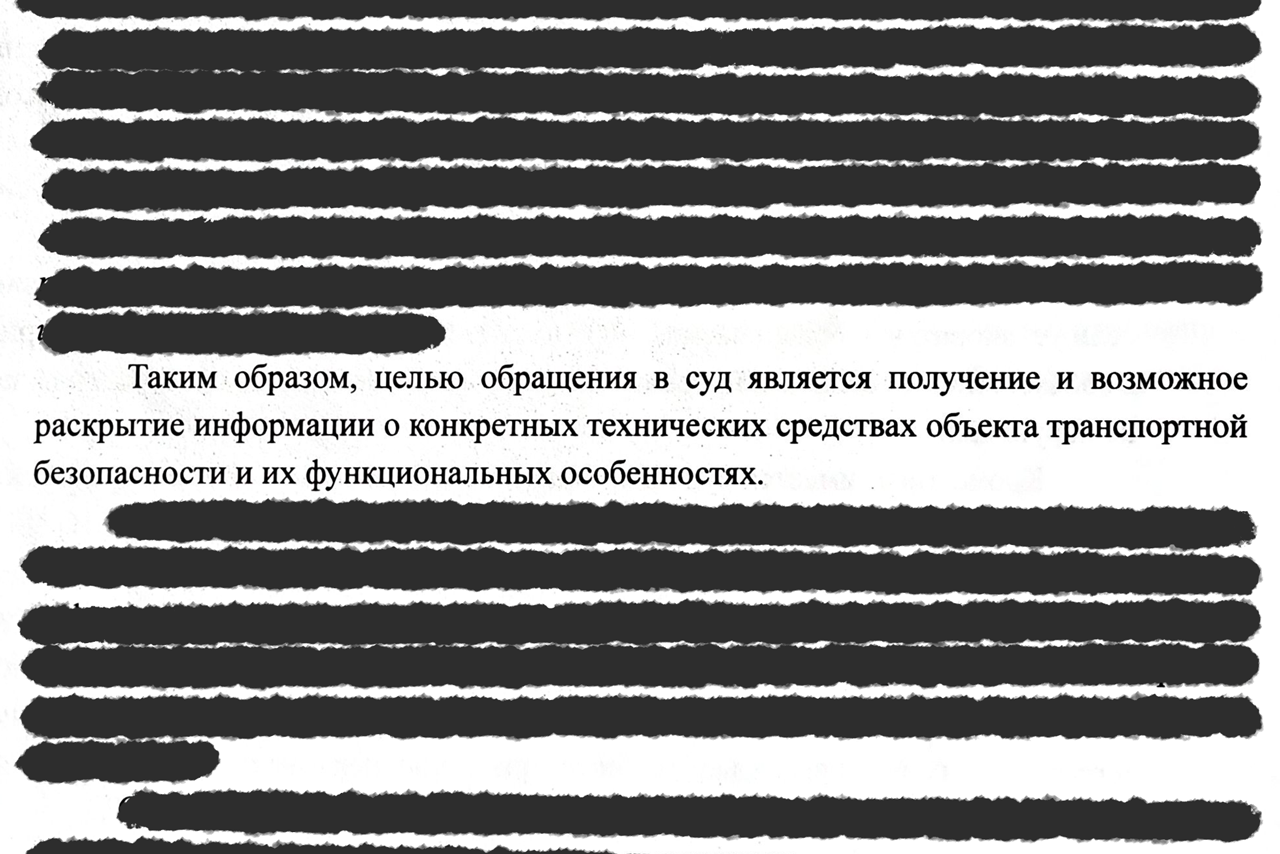
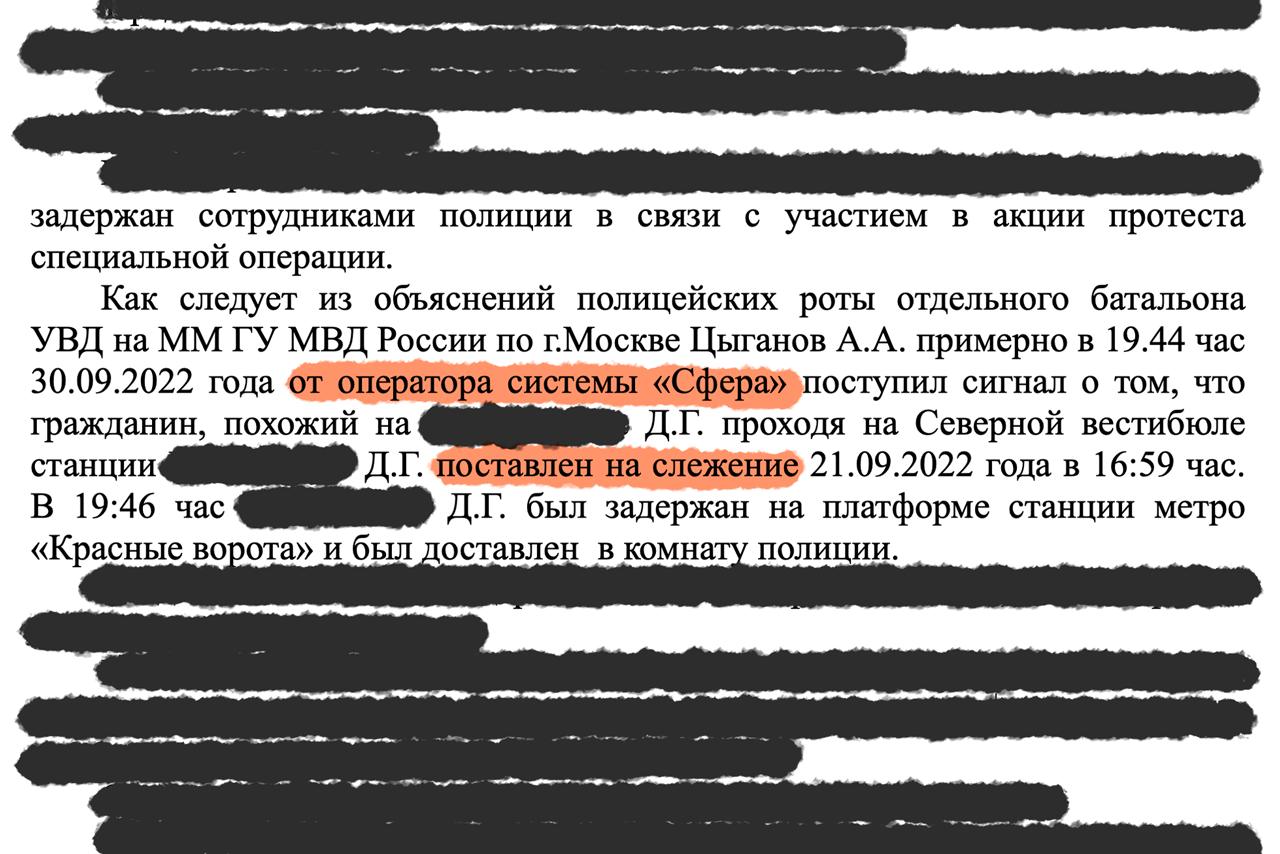
Unlike the ECHR, Russian courts refuse to admit that the use of the system in such a way perpetuates discrimination, violates the right to privacy, and infringes on freedom of expression and assembly. In all known cases, the courts of the First Instance refused to recognize the detention based on the FRS use as illegal. OVD-Info continues to challenge these decisions. If Russian courts do not consider our arguments, we will turn to UN bodies that still have some leverage over the Russian authorities. Moreover, if the violation of rights took place before 16 September 2022, we also retain the right to appeal to the ECHR.
It is unlikely that the ECHR decision on Glukhin’s case will have an immediate effect on the issue of the use of the FRS for the political persecution; because even though the Russian government is obliged to comply with ECHR rulings concerning the violation of the rights that took place before September 16, 2022, it has unilaterally refused to do so.
Still, the ECHR decision did not go to waste, as it has drawn attention to the issue and has shown the detention of Nikolai Glukhin as unlawful. Importantly, the court has provided a high-level expert opinion that must be taken as a standard for all the member states of the Council of Europe, for it contributes to the formation of European and world standards of the protection of human rights.
If the Russian state authorities have used facial recognition technology against you because of your political stance or because of your participation in political protest, we are ready to help you appeal to court and international organizations — email us at data@ovdinfo.org. If you are a journalist or a researcher or a policy maker interested in learning more about the matter — email us at media@ovdinfo.org



